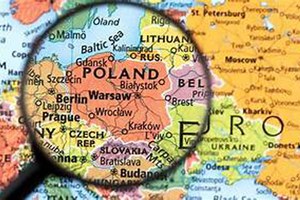The impact of Coronavirus on Poland in terms of SDG 5, SDG 10.7, SDG 11, SDG 13, SDG 16
The threat of coronavirus has spread around Europe rapidly. From one day to another, shops, corporations, clubs, cafes etc. and public institutions has been shut down or sent to home office. In case of restaurants, only takeaways started to be allowed. Distance between people has become crucial and statistics about new infections keep buzzing in media all the time. People were told to avoid any unnecessary going-out and worldwide economics faced a real crisis. How has been Poland impacted in terms of Sustainable Developmental Goals and which kind of prevention steps have been made?
When it comes to SDG 5, which stands for gender equality, the impact is not so clear. However, suspending traditional learning in favour of e-learning makes mothers more liable to taking care of home and educational progress of their children, which in fact is a great burden itself. Also, in terms of rising unemployment women are more liable to lose their jobs. As for now, Polish government is preparing widespread anticrisis programme (so called: “anticrisis shield”), which may support the inequalities stemming from gender.
When it comes to SDG 10.7, the situation affects migrants in our country, especially Belarusians (who are not allowed to return from Poland) and Ukrainians (who were the biggest minority and may be liable to lose their jobs or feel forced to come back to their country due to unstable market. The rising unemployment may cause Poland less attractive in terms of work, as many people are most likely to lose their jobs (and many companies – in spite of governmental help – may be shut down permanently), so they will be forced to find another one. There were not many institutions able to help migrants in Poland (in fact, most of the work are conducted by NGOs working for migrants), so the crisis in fact left these people alone. Luckily, on-line support is working, which may help reduce the side effects of the situation.
In terms of SDG 11, public transport has been pointed out as one of the most dangerous place for potential infections. Thus, local goverments in Wielkopolska Region (not in Poznan only) have decided to reduce the amount of buses, trains and trams in general, clean up the elements widely used by commuters more often, as well as reduce – after a while – the number of people who are supposed to be in tram or bus. Also, it is impossible to get on the bus or tram, using the first door, which may help drivers feel safe, and people who do not use their monthly (or longer) tickets can apply for a refund in order to use public transport more efficiently to own needs (amount of people in trams have fallen down even by 60 percent!) These steps caused a big crowd in the early morning and afternoon, though, and trying to find a solution seems to be crucial at that time, in order to make the public transport accessible to everyone.
The climate change goal, SDG no. 13, seems to benefit the most from the situation. Less traffic and less tourism (also due to blocking thousands of planes) affect the quality of air (although some people staying at home still prefer to use forbidden ways to warm themselves up). The truth is that climate change challenge has become the second important issue, being overtaken by good health and life quality, which does not mean it is not important. That is why the solutions making people stay at home seems to be beneficial. The big challenge, though, is the rising amount of medical garbage, which may be utilized in not so ecological way. Also, recent situation may not support zero waste movement – or quite the opposite, depending on the perspective.
The goal 16, which is connected with peaceful and inclusive societies, is the most complex one. On the one hand, people all over the world united each other to be the support in the crisis, but on the other hand – some actions may not help in maintain the peace and inclusion. Closed offices, avoiding many issues to be solved on-line only, including the meetings of Parliament, which is a unique phenomenon – may be inclusive only to some extent. We need to remember that situation is temporary, though. The epidemic state, implemented by Polish government on 23th March, forces public institution to react in fast, yet not always transparent way.
To sum up, the recent situation impact Polish society and it is difficult to say how much will it be difficult to face the reality in next days. So far, Poland has 1,244 officially confirmed infections (as for 27th March 2020) and 14 deaths. All we can do is to follow the rules, be responsible and stay safe. After all, everything is “in our hands” right now, more than ever…

